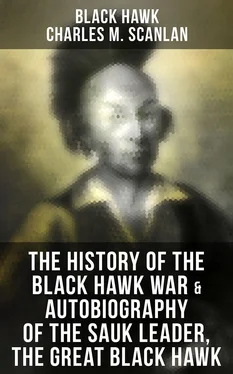The facts which he states, respecting the Treaty of 1804, in virtue of the provisions of which the government claimed the country in dispute and enforced its arguments with the sword, are worthy of attention. It purported to cede tot he United States all of the country, including the village and corn-fields of Black Hawk and his band, on the east side of the Mississippi. Four individuals of the tribe, who were on a visit to St. Louis to obtain the liberation of on of their people from prison, were prevailed upon, says Black Hawk, to make this important treaty, without the knowledge or authority of the tribes, or nation.
In treating with the Indians for their country, it has always been customary to assemble the whole nation; because, as has been truly suggested by the Secretary of War, the nature of the authority of the chiefs of the tribe is such, that it is not often that they dare make a treaty of much consequence, and we might add, never, when involving so much magnitude as the one under consideration, without the presence of their young men. A rule so reasonable and just ought never to be violated, and the Indians might well question the right of the Government to dispossess them, when such violation was made the basis of its right.
The Editor has written this work according to the dictation of Black Hawk, through the United States Interpreter, at the Sac and Fox Agency of Rock Island. He does not, therefore, consider himself responsible for any of the facts, or views, contained in it, and leaves the Old Chief and his story with the public, whilst he neither asks, nor expects, any fame for his services as an amanuensis.
THE EDITOR.
Autobiography of Black Hawk
Table of Contents
I was born at the Sac village, on Rock river, in the year 1767, and am now in my 67th year. My great grandfather, Nanamakee, or Thunder, according to the tradition given me by my father, Pyesa, was born in the vicinity of Montreal, Canada, where the Great Spirit first placed the Sac nation, and inspired him with a belief that, at the end of four years he should see a white man , who would be to him a father. Consequently he blacked his face, and eat but once a day, just as the sun was going down, for three years, and continued dreaming, throughout all this time whenever he slept. When the Great Spirit again appeared to him, and told him that, at the end of one year more, he should meet his father, and directed him to start seven days before its expiration, and take with him his two brothers, Namah, or Sturgeon, and Paukahummawa, or Sunfish, and travel in a direction to the left of sun-rising. After pursuing this course for five days, he sent out his two brothers to listen if they could hear a noise, and if so, to fasten some grass to the end of a pole, erect it, pointing in the direction of the sound, and then return to him.
Early next morning they returned, and reported that they had heard sounds which appeared near at hand, and that they had fulfilled his order. They all then started for the place where the pole had been erected; when, on reaching it, Nanamakee left his party and went alone to the place from whence the sounds proceeded, and found, that the white man had arrived and pitched his tent. When he came in sight, his father came out to meet him. He took him by the hand and welcomed him into his tent. He told him that he was the son of the King of France; that he had been dreaming for four years; that the Great Spirit had directed him to come here, where he should meet a nation of people who had never yet seen a white man; that they should be his children and he should be their father; that he had communicated these things to the King, his father, who laughed at him and called him Mashena, but he insisted on coming here to meet his children where the Great Spirit had directed him. The king had told him that he would find neither land nor people; that this was an uninhabited region of lakes and mountains, but, finding that he would have no peace without it, he fitted out a napequa, manned it, and gave him charge of it, when he immediately loaded it, set sail and had now landed on the very day that the Great Spirit had told him in his dreams he should meet his children. He had now met the man who should, in future, have charge of all the nation.
He then presented him with a medal which he hung round his neck. Nanamakee informed him of his dreaming, and told him that his two brothers remained a little way behind. His father gave him a shirt, a blanket and a handkerchief besides a variety of other presents, and told him to go and bring his brethren. Having laid aside his buffalo robe and dressed himself in his new dress, he started to meet his brothers. When they met he explained to them his meeting with the white man and exhibited to their view the presents that he had made him. He then took off his medal and placed it on his elder brother Namah, and requested them both to go with him to his father.
They proceeded thither, were where ushered into the tent, and after some brief ceremony his father opened a chest and took presents therefrom for the new comers. He discovered that Nanamakee had given his medal to his elder brother Namah. He told him that he had done wrong; that he should wear that medal himself, as he had others for his brothers. That which he had given him was typical of the rank he should hold in the nation; that his brothers could only rank as civil chiefs , and that their duties should consist of taking care of the village and attending to its civil concerns, whilst his rank, from his superior knowledge, placed him over all. If the nation should get into any difficulty with another, then his puccohawama, or sovereign decree, must be obeyed. If he declared war he must lead them on to battle; that the Great Spirit had made him a great and brave general, and had sent him here to give him that medal and make presents to him for his people.
His father remained four days, during which time he gave him guns, powder and lead, spears and lances, and taught him their use, so that in war he might be able to chastise his enemies, and in peace they could kill buffalo, deer and other game necessary for the comforts and luxuries of life. He then presented the others with various kinds of cooking utensils and taught them their uses. After having given them large quantities of goods as presents, and everything necessary for their comfort, he set sail for France, promising to meet them again, at the same place, after the 12th moon.
The three newly made chiefs returned to their village and explained to Mukataquet, their father, who was the principal chief of the nation, what had been said and done.
The old chief had some dogs killed and made a feast preparatory to resigning his scepter, to which all the nation were invited. Great anxiety prevailed among them to know what the three brothers had seen and heard. . When the old chief arose and related to them the sayings and doings of his three sons, and concluded by saying that the Great Spirit had directed that these, his three sons, should take the rank and power that had once been his, and that he yielded these honors and duties willingly to them, because it was the wish of the Great Spirit, and he could never consent to make him angry.
He now presented the great medicine bag to Nanamakee, and told him that he "cheerfully resigned it to him, it is the soul of our nation, it has never yet been disgraced and I will expect you to keep it unsullied."
Some dissensions arose among them, in consequence of so much power being given to Nanamakee, he being so young a man. To quiet them, Nanamakee, during a violent thunder storm, told them that he had caused it, and that it was an exemplification of the name the Great Spirit had given him. During the storm the lightning struck, and set fire to a tree near by, a sight they had never witnessed before. He went to it and brought away some of its burning branches, made a fire in the lodge and seated his brothers around it opposite to one another, while he stood up and addressed his people as follows:
Читать дальше





![Theresa Cheung - The Dream Dictionary from A to Z [Revised edition] - The Ultimate A–Z to Interpret the Secrets of Your Dreams](/books/692092/theresa-cheung-the-dream-dictionary-from-a-to-z-r-thumb.webp)






